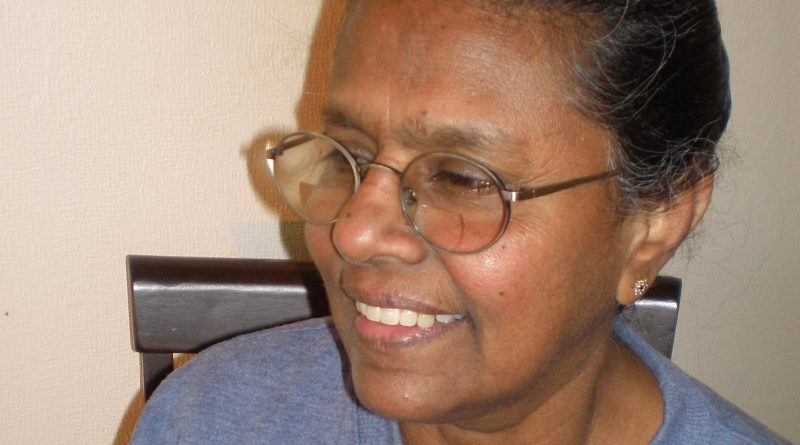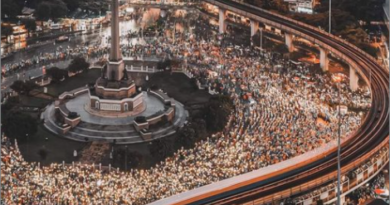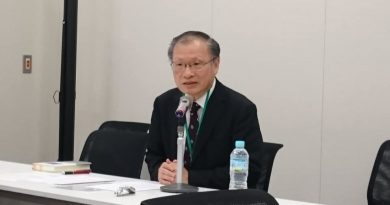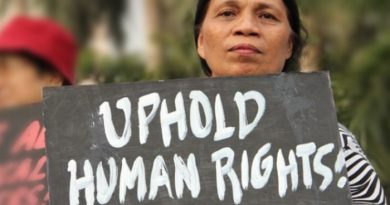Interview with Dr. N. Malathy
Dr. N. Malathy, as many other Tamils, left Sri Lanka in the 1970s due to ongoing oppression they experienced in the hands of the Sri Lankan state. During the peace process that started in 2002 between the Sri Lankan state and the Liberation Tigers of Tamil Eelam (LTTE) she returned from New Zealand to her homeland to work as a humanitarian worker as many other Tamil professionals did. She has an insider’s knowledge about the multiple services of the Tamil state and was a leading member of the North Eastern Secretariat on Human Rights (NESoHR). She worked closely with the LTTE Peace Secretariat, its women’s organization; the Centre for Women’s Development and Rehabilitation, and with orphanages. As the Sri Lankan state launched a full scale war against the northern part of the Tamil state between 2007-2009, with thousands of others she had to flee from her homeland. The Sri Lankan military detained her for 4 months in a concentration camp. She is the author of the book A Fleeting Moment in My Country: The Last Years of the LTTE De-facto State (2012). The book vividly explains how the Tamils built a state of their own, how it was destroyed and her life in a Sri Lankan concentration camp.
1. You lived a comfortable life in New Zealand for many decades and what made you to leave that life and to go to the Tamil region during the peace process that started in 2002?
NM: I am an Eelam Tamil and wherever I may be I am connected to the struggle of my people. True, my body was in New Zealand, but my heart and soul was and is with my people. In fact, I am a social activist. Even in New Zealand I was working as a social activist. After decades long war, the 2002 peace process gave a new hope to the Tamil people and I would say for the whole of the island. Had we succeeded in the peace process the island would have been one of most peaceful places on earth. At first I made several short trips to Vanni in the North where the Tamil state was fully functioning through numerous services. Later I decided to live there since 2005. I felt that I should fully support my people to build their lives, which had been ravaged by war. In the midst of war for nearly 20 years and oppression by the Sri Lankan state for over 60 years the Tamil people had succeeded in building welfare services, women’s organizations, orphanages, medical centers, farms, media institutions, documentation centers, schools, courts, banks and so many other services. It was a new state coming out of the rubbles of war after decades long oppression. I felt I should be with them at this most crucial time of their struggle.
The Tamil people were seeking international recognition and support to be as equal as everyone else. In the eyes of the USA, the UK and India the LTTE was a “terrorist” organization, but the other EU countries as well as China and Japan saw the LTTE as Tamil national leaders. For the Tamil people they were their liberators and the government. Many foreign delegates from these countries met the Tamil national leaders and these leaders could visit some of the major European countries. During the peace process China was the first country to send a trade delegation to meet the LTTE political leaders in Vanni. Through my bi-lingual and other skills I felt deep within me that I should be part of this great moment where the ordinary people are working hard in so many ways in Vanni to achieve the goal of peace with justice. I documented decades long violations of human rights by the Sri Lankan state against the Tamil people so that the world would know about it. I drafted letters for the Peace Secretariat with appeals to the international community to support us for reconstruction, rehabilitation and demilitarization. All these reflected a basic human demand to be recognized as a people, their national struggle to be equal amongst other nations, and as a state. In fact, treating us as equals is the only way to stop historical oppression and annihilation of my people. Struggle for such equality is guaranteed under international law and above all by our moral conscience. The struggle of my people was to achieve peace, peace with equality. I felt I should be part of this journey of my people by physically been with them in Vanni.
2. You experienced the war between 2007-2009. Can you explain this experience?
NM: The Sinhala right wing nationalist forces were very weak before and during the signing of the 2002 ceasefire agreement and the subsequent peace process. But they gained new confidence by 2005-2006 because of the support given by the USA and UK to the Sri Lankan state. As a result rather than a humane negotiated political settlement with the LTTE, the most brutal military option was pushed forward. In fact, the war started not in 2007, but by August 2006. It started by killing young Tamil women. The Sri Lankan air force bombed an orphanage in the Tamil city of Killinochchi in Vanni where hundreds of female students were attending a special educational programme. In that, 54 young girls were killed and more than 150 got seriously injured. During the same period, the Sri Lankan security forces launched a full war around the Trincomalee harbor area in the East killing nearly 200 people. As you know the Trincomalee harbor is one of the most strategic harbors in the world and the US Pacific Command in their visit to the harbor in 2002 had advised the Sri Lankan state to capture the Tamil areas surrounding the harbor. This is exactly what happened. Securing this harbor is essential for the US pivot towards Asia. The US did not fight the war by sending its soldiers like in Iraq, but fully backed the Sri Lankan state and its security forces in many ways to fight the war against us.
There was a specific pattern of the war. The security forces first surrounded an area. They blocked food and medical supplies and then fired towards the civilians from ground and air. This is the same method that was used when they started attacking Vanni in the North in 2007 where there were at least half a million people. I lived there. In fact, it was a total war. Soon all the International NGOs including the UN agencies were asked to leave the region by the Sri Lankan state. No journalist was allowed. All the essential items coming to Vanni were stopped by the Sri Lankan state. There was no food, no medicine and no fuel. All these were weapons of war. Aerial bombardment was very common, at the beginning every week and later every day. It was indiscriminate bombing. Places of worship, hospitals and schools where thousands of people found shelter were bombed many times. Each time a hospital is bombed, the Tamil health workers move the hospital to another location and again this new temporary hospital was bombed and then again it is moved to another place. The same happened again and again. The UN spokesperson for Sri Lanka later said that there were 16 times of moving of the hospitals and these places were bombed over 60 times. Can you imagine the carnage? People who were queuing for food in front of welfare centers were bombed. Some people could not help the bleeding family members because if they got out of their bunkers they will be bombed again. Many who went to help the wounded immediately after the shelling and bombing got killed because there was another round of attacks. The Sri Lankan security forces deliberately targeted the civilians. It was an ongoing annihilation of a people. It was more than war crimes or crime against humanity. It was genocide.
Some of us who had international contacts tried desperately to tell the world about the massacres. The LTTE called for a ceasefire. Thousands of Tamils in Melbourne, Tamil Nadu, London, Dusseldorf, Paris, Oslo, Toronto and in many other places carried out public demonstrations demanding to stop the war against their homeland. Not a single UN Security Council was held to discuss the situation. In fact, some EU countries wanted to put pressure on the Sri Lankan state to agree to a ceasefire, but again the UK and USA blocked their moves. At the time of the 2002 peace process the Tamil state had around 15,000 square kilometers, but by the first part of 2009 it was reduced to just 1.5 square kilometers to the size of a park where there were nearly 350,000 people. This small peace of land was near the coast which was bombed from air, land and sea. The white police officer in the USA knelt on the neck of George Floyd, for 8 minutes and 46 seconds while the African American pleaded for breath to live. The knees of the Sri Lankan security forces with the full weight of the world powers were on our throats for nearly two years. We, Tamils, cried out for breath to live in our own homeland and there was no one to stop the carnage. We, Tamils, who struggled to be equal and free as a people were forced to run away for our survival. Some LTTE members surrendered to the Sri Lankan military with the assurance given by the UN, Sri Lankan President and international mediators, but they were tortured and killed by the Sri Lankan security forces. At the end there were nearly 300,000 people who were put into concentration camps by the Sri Lankan military. I was in one of these camps. There are at least over 140,000 people who have been unaccounted for. We do not know what happened them. According to the UN reports there are at least 70,000 Tamils who were killed during the last phase of the war.
3. What was your experience in the concentration camps?
NM: These camps were called welfare centers by government. Immediately after the war the former UN secretary general Ban Ki Moon visited one of these camps and approved UN aid to the government to run these camps. In reality, these were not welfare centers or refugee camps, but barbed wired concentration camps like Nazi concentration camps. These were controlled by the Sri Lankan military. The military, with batons or guns in hand, treated all of us like criminals. The military did not hesitate to use them to beat men and women and even the elderly. When the military were angered, they kicked the people with their boots. No one dared to complain againt the military. Every day the military took away people whom they suspected as LTTE members. There were thousands of such arrests. Most of these people were working in the civilian administration of the Tamil state. Even the children, women and elderly were taken away. We did not know what happened to them. The racial abuse againt us was a common practice. The childeren were forced to sing the Sri Lankan natoional anthem in Sinhala. All the people were kept within the camps. No journalist was allowed to enetr the camp and no one was allowed to go out. It was an open prison or an an open place where thosuands of people were kept as hostages. Women were very vulnerable. Sexual assualt on women by the military was rampant. No one dared to speak out. We are totally a subjugated people. There was a mood of Sinhala racist triumphalism.
Sometimes, when a Sinhala cabinet minister visited the camp, the convoy of Sinhala video teams that came with him would throw food at the people and then video with amusement as the people scrambled for the food that fell on the ground. The struggle to get out of this hell occupied all our minds constantly. During those four months in the camp, it was the condition of the children at the camp that I found most depressing. Children had frequent fever, vomiting and diarrhea. Some children contracted Hepatitis A. Newborn babies were sent from hospitals, just a few days after being born, into the camp conditions, which were unsuitable even for adults. Toddlers played in the filthy area right in front of the toilets. I had never seen flies and mosquitoes in such numbers in my life. While eating, one hand was fully occupied with chasing the flies; a practice that children would not adopt, thus consuming food contaminated by flies that came straight from the toilets very nearby. The majority of the children, including infants, did not have milk (powder) except an occasional packet handed out by some charitable organization. Once, a father of a seven-month-old baby came begging for some sugar to put in the plain tea (black tea) to be given to his seven month old baby because the mother did not have enough breast milk and the baby was hungry. Plain tea had become the regular diet for this baby. The diet was most definitely inadequate for the children, despite some nutritional supplements that were distributed by some international agency. There was no milk, meat or vegetable in their diets. Sometimes soya beans were given, but they were of rotten quality, and the children would hardly eat them. Illness among the children was pandemic, and they were wasting away. Small injuries became infected and caused problems. Where was the UN aid? The UN did not monitor the situation at all. There was no international monitoring. All power was given to the Sri Lankan state and to its security forces.
The war conditions and the eventual escape from the war zone also separated families. Often while escaping, part of the family would cross over to the Lankan side, while the others failed to cross over. Again, many families wrote dozens of letters and made many tearful trips to the government office in the camp trying to locate the missing members. Success often came by sheer luck and not through any set procedure. It was chaos all around. There were heartbreaking scenes when bus loads of people who walked out of the war zone arrived in the camps. People in the camps would run behind these buses hoping to catch a glimpse of a missing relative. If someone in the bus waved at them, there would be endless speculation about whom the wave was directed at and who the person was. These were all signs of a longing that family members who were not already in the camp had survived and made it across. As I was a citizen of New Zealand I stayed only 4 months in the concentration camps, but others had to stay there nearly for 2 years. What was the crime we committed? We demanded our freedom to live as a people, and as a nation as every other nation in our own homeland. We never wanted to invade another land. It was because of our collective will to freedom that we were treated as criminals and herded into inhuman detention camps, including our children.
4. As someone who has gone through the war what would you tell the Korean people and the international community?
NM: We all want to tell the real stories our struggles to the world. Our story is not only a story of loss and pain, but also a story of resistance and hope. The Korean people want to tell the real stories of their historical oppression under the Japanese colonial rule as well as of their resistance. They want to talk about Jeju Sasam which is both their loss and uprising. They want to talk about Guwangju, which was their resistance to dictatorship and pain of loss of lives. They want to tell the true story of the painful division of their nation and their ongoing hope of peaceful unification with equal dignity given to both North and South. We as Tamils want to tell the world our story in the same way. Many governments in the world and the NGOs who are funded by these governments do not want to us to tell our true stories. They want to delete or edit one part our story. They do not want us to talk about our resistance, our hope for liberation and our love for our homeland. They portray what happen to us as individual violations of human rights. Our collective identity and struggle is not recognized at all, because it goes against the geopolitical agendas. The UN Resolutions on Sri Lanka, which were sponsored by the USA after the war, have deleted the word Tamil. We, as a Tamil nation, do not exist for them. Only Sri Lanka exists. There were three occasions where I could tell my story fully. One was in Dublin when I had to give evidence at the first session of the Peoples’ Tribunal on Sri Lanka and secondly in Bremen in Germany at the second session of the same Tribunal. Thirdly it was in Ecuador at a series of meetings organized by the indigenous people whose stories are similar to genocide; resistance and ours. They listened to our full story. They expressed deep empathy and solidarity. I felt there is hope and we Tamils are not alone in the world. I hope that the Korean people too will listen to our full story as they too have been going through a similar struggle like us. Please do not allow our story to be deleted or to be edited to suit the global agendas. Our story is necessary for all the people who struggle for justice and peace. We are a people and we are a nation. We are not mere individuals.




